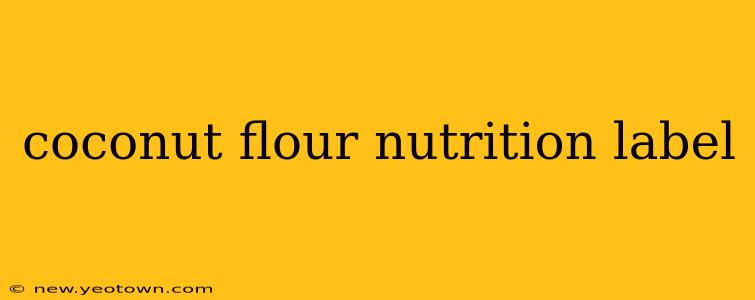Coconut flour has exploded in popularity, gracing the shelves of health food stores and inspiring countless recipes online. But what exactly is in this finely-ground wonder, and how does it stack up nutritionally? Let's dive into the typical coconut flour nutrition label and uncover its secrets.
Imagine this: you're standing in the grocery aisle, a bag of coconut flour in your hand. The nutrition label stares back, a jumble of numbers and percentages. It's time to demystify those figures and understand what they really mean for your health and baking adventures.
What Does a Typical Coconut Flour Nutrition Label Show?
A typical coconut flour nutrition label will showcase a profile rich in fiber, protein, and healthy fats, but relatively low in carbohydrates compared to other flours. You'll likely find the following:
-
High Fiber Content: This is a star feature of coconut flour. It's packed with dietary fiber, crucial for digestive health and helping you feel full and satisfied. This high fiber content also contributes to its ability to absorb liquid, making it essential to adjust liquid amounts in recipes.
-
Moderate Protein: While not as high in protein as some other flours, coconut flour still offers a respectable amount, contributing to its versatility in both sweet and savory dishes.
-
Healthy Fats: Coconut flour contains medium-chain triglycerides (MCTs), a type of saturated fat that's metabolized differently than other fats and can provide a quick source of energy.
-
Low Carbohydrate Count: Compared to wheat flour, coconut flour boasts a significantly lower carbohydrate content, making it a popular choice for low-carb and ketogenic diets. However, it's important to remember that the net carbs (total carbs minus fiber) are a more accurate reflection of the carbohydrate impact on blood sugar.
-
Vitamins and Minerals: Although not the primary nutritional powerhouse, coconut flour offers small amounts of various vitamins and minerals, including manganese and iron.
How Does Coconut Flour Compare to Other Flours?
Many people choose coconut flour as a substitute for other flours, particularly wheat flour. But how do their nutritional profiles compare? Wheat flour is higher in carbohydrates and lower in fiber and fat. The significant difference lies in the glycemic index; coconut flour has a much lower glycemic index, meaning it won't cause a rapid spike in blood sugar levels. This makes it a healthier option for individuals with diabetes or those watching their blood sugar.
Is Coconut Flour Gluten-Free?
Yes, coconut flour is naturally gluten-free, making it a suitable alternative for people with celiac disease or gluten intolerance. This is a significant advantage over many other traditional flours.
What Are the Benefits of Using Coconut Flour?
The benefits of incorporating coconut flour into your diet extend beyond its nutritional profile. Its high fiber content aids digestion, promoting regularity and gut health. The MCTs contribute to energy production, and its gluten-free nature makes it accessible to a wider range of individuals.
How Can I Incorporate Coconut Flour into My Diet?
Coconut flour's versatility shines through in its adaptability to various recipes. It can be used in baking, creating everything from cakes and muffins to pancakes and breads. It also finds its place in savory dishes, thickening sauces and adding a subtle coconut flavor. However, remember that due to its high absorbency, recipes often require adjustments to liquid quantities.
What are the potential downsides of coconut flour?
While coconut flour offers many benefits, it's important to be aware of potential drawbacks. Its high fiber content can cause digestive issues such as bloating or gas if consumed in large quantities. Additionally, its strong coconut flavor might not be suitable for all recipes or palates. Finally, it can be quite absorbent, necessitating careful adjustments to liquid amounts in recipes.
This exploration of the coconut flour nutrition label provides a comprehensive overview of this increasingly popular ingredient. Remember that nutritional values may vary slightly depending on the brand and processing methods, so always check the specific label on your chosen product. Using coconut flour judiciously and understanding its properties will allow you to fully enjoy its unique benefits in your culinary creations.

